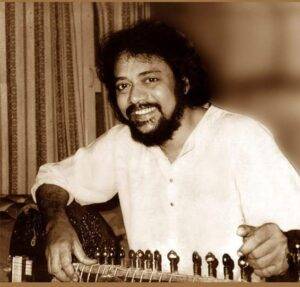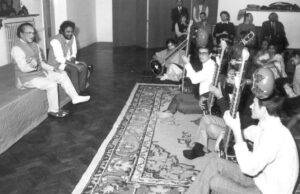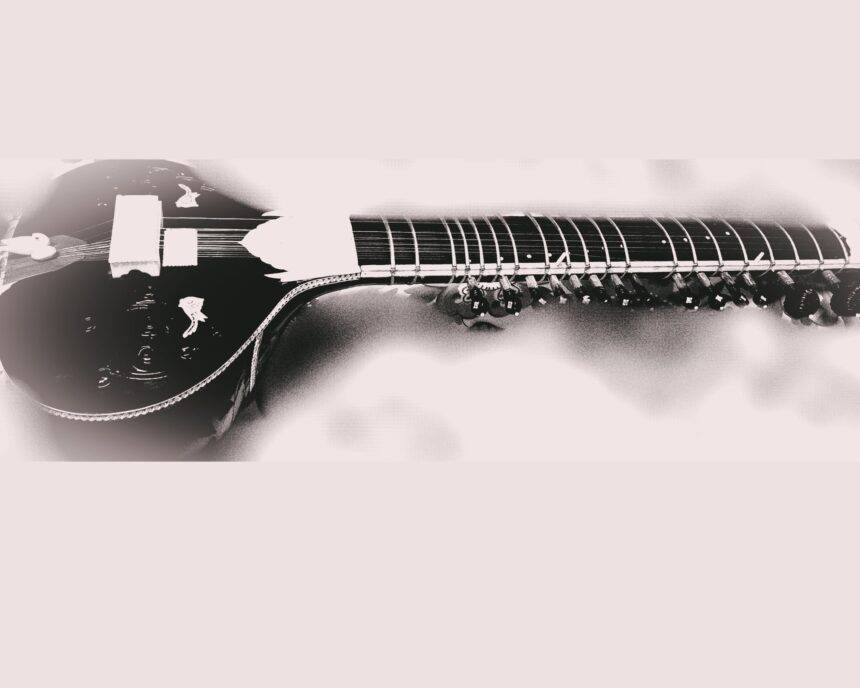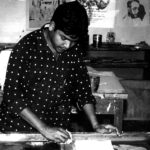Today’s write-up was unplanned but arose spontaneously because this was a significant week for me. On the 16th of June, we celebrate the birth anniversary of my Guru Pandit Deepak Choudhury, one of the most exceptional sitar players in history. I consider myself immensely fortunate to have had the opportunity to learn from him, although it saddens me that my time as his student was relatively brief, spanning only a few years. As I joined in the final years of his life, my knowledge about Guruji may be limited. However, the memories I cherish of him have had a profound impact on me, serving as a constant source of inspiration in how I approach life. To me, Guruji embodied a life fully immersed in music. Nothing brought him greater joy than the realm of melodies and rhythms. His entire being resonated with the spirit of music, and witnessing his passion was truly remarkable. While there are numerous esteemed students of Guruji who have excelled in the realm of sitar music both in India and abroad, I might get lost there. Even many of my fellow disciples, who were senior to me, may not recognize my name. However, for me, Pandit Deepak Choudhury holds immense significance as the person who introduced me to this enchanting world of music. The memories I cherish are those of being his disciple, attending his classes held at his residence and at Rabindra Bharati University in Kolkata, where he served as a professor of sitar. In those precious moments, I experienced the guidance and teachings of Guruji firsthand, which shaped my musical path and ignited a deep passion within me. Though my accomplishments may not be as widely known, the impact of his mentorship remains etched in my heart; forever grateful for the profound influence he had on my musical journey.

Pandit Deepak Choudhuri, one of the notable disciples of the renowned sitar maestro Pandit Ravi Shankar, resided in the southern part of Kolkata, a city in India. His exceptional skill and musicality were often likened to that of his guru, earning him great recognition among the disciples of Panditji. In his early career, various contemporary newspapers and articles lauded his abilities, drawing comparisons to Pandit Ravi Shankar himself. Moreover, those who reminisced about him described Pandit Deepak Choudhuri as a true reflection of his guru, not only in the realm of music but also in his passion for football, politics, world affairs, films, and even cooking. His multifaceted interests and pursuits added depth to his character, further contributing to his legacy.
In a video conversation titled “Remembering Pandit Deepak Choudhury ” on his 75th birth anniversary, Sukanya Shankar, the wife of Pandit Ravi Shankar, shared her thoughts on Deepakji. She revealed that Deepakji did not believe in the concept of God and considered himself an atheist. However, in a conversation with Sukanya, Deepakji expressed a profound sentiment, saying, “You say I don’t believe in God? If ever God exists, he is my god,” while pointing towards Panditji. This heartfelt statement exemplified Deepakji’s unwavering dedication and reverence towards his guru, Pandit Ravi Shankar. Deepakji’s dedication to Pandit Ravi Shankar extended beyond mere words. It was a lifelong commitment manifested through unwavering loyalty and relentless pursuit of musical excellence. Deepak ji considered Panditji not just a guru but a guiding light, shaping his artistic journey and molding his musical sensibilities. In countless hours of rigorous practice, Deepakji immersed himself in the teachings and techniques imparted by Pandit Ravi Shankar. He embraced the intricacies of the sitar, honing his skills with unwavering determination and a deep sense of respect for his guru. Every stroke of the strings resonated with the essence of their musical lineage, carrying forward the traditions and legacy that Pandit Ravi Shankar had entrusted to him. Beyond the realm of music, Deepakji embodied the values and principles instilled by Pandit Ravi Shankar. He embraced discipline, humility, and a profound sense of gratitude toward his guru. Deepakji’s unwavering dedication was a testament to the profound impact Pandit Ravi Shankar had on his life and musical journey.
Despite Deepakji’s untimely departure before his Guruji, his commitment to upholding Pandit Ravi Shankar’s musical legacy remained unwavering. He dedicated himself to the preservation and propagation of the profound heritage of Indian classical music, faithfully carrying out his guru’s vision. Deepakji’s lifelong devotion to Pandit Ravi Shankar left an indelible mark on the history of music, embodying the essence of the cherished bond between a guru and his disciple. His efforts stand as a testament to the enduring power of their connection and the timeless influence of their shared musical journey.

In addition to inheriting the remarkable techniques and artistry of Pandit Ravi Shankar, Pandit Deepak Chaudhuri developed his own exceptional pedagogies for teaching music. His innovative methods nurtured a new generation of musicians, many of whom have gone on to achieve great success in the field of music. Beyond his captivating solo performances on the sitar, Pandit Deepak Chaudhuri showcased his versatility and creativity through his compositions and performances in fusion music. His ability to seamlessly blend diverse musical genres and styles created a unique sonic tapestry that resonated with audiences. His fusion endeavors not only pushed the boundaries of traditional Indian classical music but also opened up new avenues for experimentation and collaboration. Pandit Deepak Chaudhuri’s musical prowess extended beyond the realms of fusion. He lent his musical expertise to the world of cinema, composing and performing music for numerous films. His compositions added depth, emotion, and a touch of his artistic brilliance to the cinematic narratives, leaving an indelible mark on the hearts of the audience.
Moreover, his collaboration with Pandit Ravi Shankar in jazz performances captivated audiences across the globe. Together, they embarked on musical journeys that merged the rich traditions of Indian classical music with the vibrant improvisations of jazz. Their combined virtuosity created awe-inspiring melodies, captivating listeners and transcending cultural boundaries.
During the phase of his life when I encountered him, Pandit Deepak Choudhury often maintained a state of tranquility, seldom engaging in extensive conversations. However, within his serene demeanor, he possessed a remarkable sense of humor, occasionally gracing us with amusing remarks. With gentle wit, he would jest about my gestures and my imperfect grasp of Bengali, knowing that I was not a native speaker. Despite being proficient in Hindi and English, he deliberately conversed with me in Bengali, allowing me to make those mistakes and providing light-hearted moments of laughter. These instances highlighted his playful nature, adding a touch of warmth and camaraderie to our interactions. These gentle, humorous exchanges not only lightened the atmosphere but also fostered a sense of comfort and camaraderie between us, transcending language barriers and forging a deeper connection. In those precious instances, I discovered that beneath the veil of his serene silence lay a gentle, mischievous spirit that added an extra layer of delight to our musical journey together.
Besides the regular weekend classes, Guruji would organize immersive camps for his students, where we would come together and stay in a dedicated place for a week or more. These camps were truly unforgettable, filled with intensive practice sessions that would continue day and night. The collective energy of Guruji and all his disciples created an atmosphere of unparalleled musical immersion. We would not only share our musical knowledge and techniques but also engage in communal activities, such as cooking meals together. The camp days were a harmonious blend of music, camaraderie, and culinary delights, as melodies echoed through the air from dawn to dusk and sometimes even throughout the night. These precious moments, spent in the company of Guruji and fellow disciples, remain etched in memory as cherished milestones in my musical journey.
As time went on, Guruji’s health began to deteriorate, and visits to the hospital became a regular occurrence. We hoped for his recovery, eagerly awaiting his return to the classes we held dear. However, the cycle repeated itself: a brief respite, followed by a decline in his condition, leading to another hospitalization. Each day seemed to bring further challenges, testing our resolve and deepening our concerns. Despite our collective prayers and wishes for his well-being, the situation gradually worsened. Finally, the day arrived when we received the heartbreaking news of Guruji’s passing. The loss reverberated through our hearts, leaving an indescribable void in our lives. We mourned the departure of not only an extraordinary musician but also a guiding light, mentor, and cherished presence. In the wake of his passing, memories flooded our minds—precious moments spent in his classes, the warmth of his guidance, and the profound impact he had on our musical journeys. We realized that Guruji’s teachings and his spirit would forever remain imprinted in our hearts, inspiring us to carry forward his musical legacy with reverence and devotion. Although the pain of his absence was profound, we found solace in the knowledge that his musical legacy would continue to thrive through his numerous disciples, spreading the beauty and depth of his art to generations to come. We vowed to honor his memory by upholding the values and principles he instilled in us, ensuring that his musical genius would forever resonate in the hearts and minds of those touched by his brilliance. While we will always miss Guruji’s physical presence, his music lives on, immortalized in recordings and cherished memories. We find solace in the belief that his soul has transcended, finding eternal peace in the realms where melodies and rhythm intertwine. May his soul rest in the celestial embrace, forever guiding us through the timeless melodies he shared and the profound lessons he imparted.




